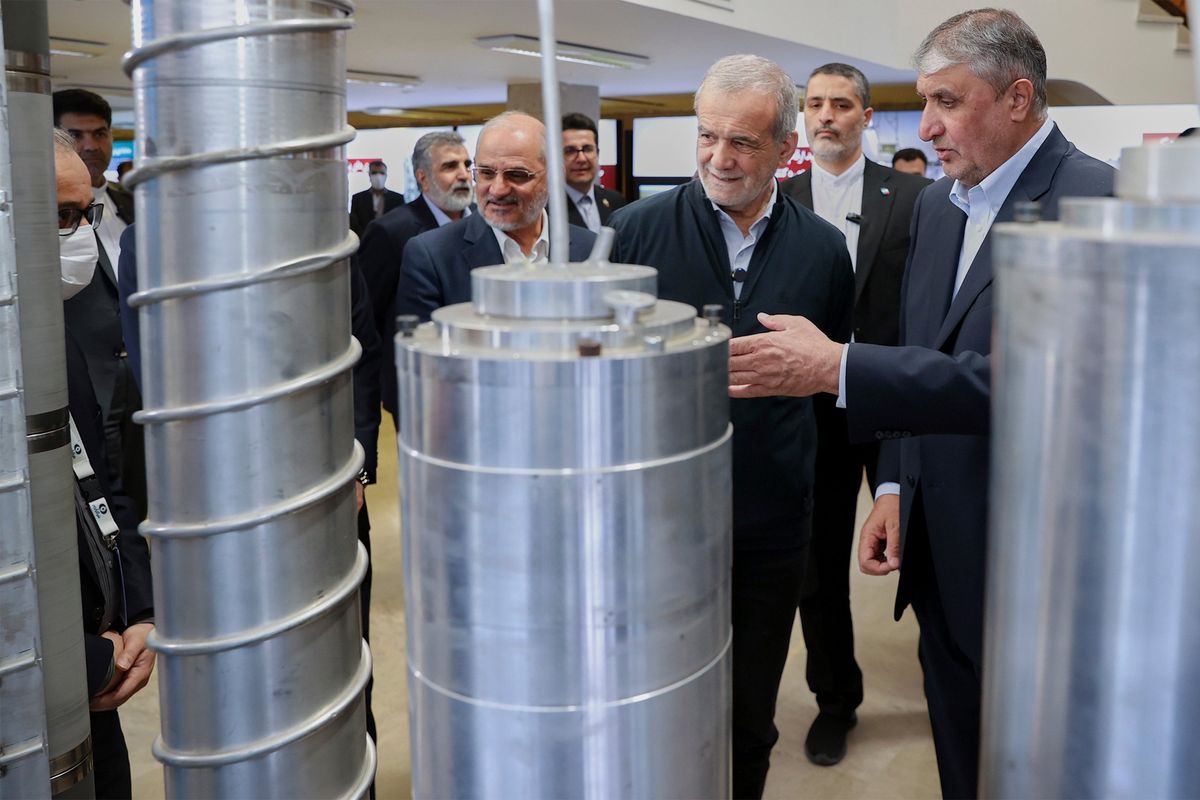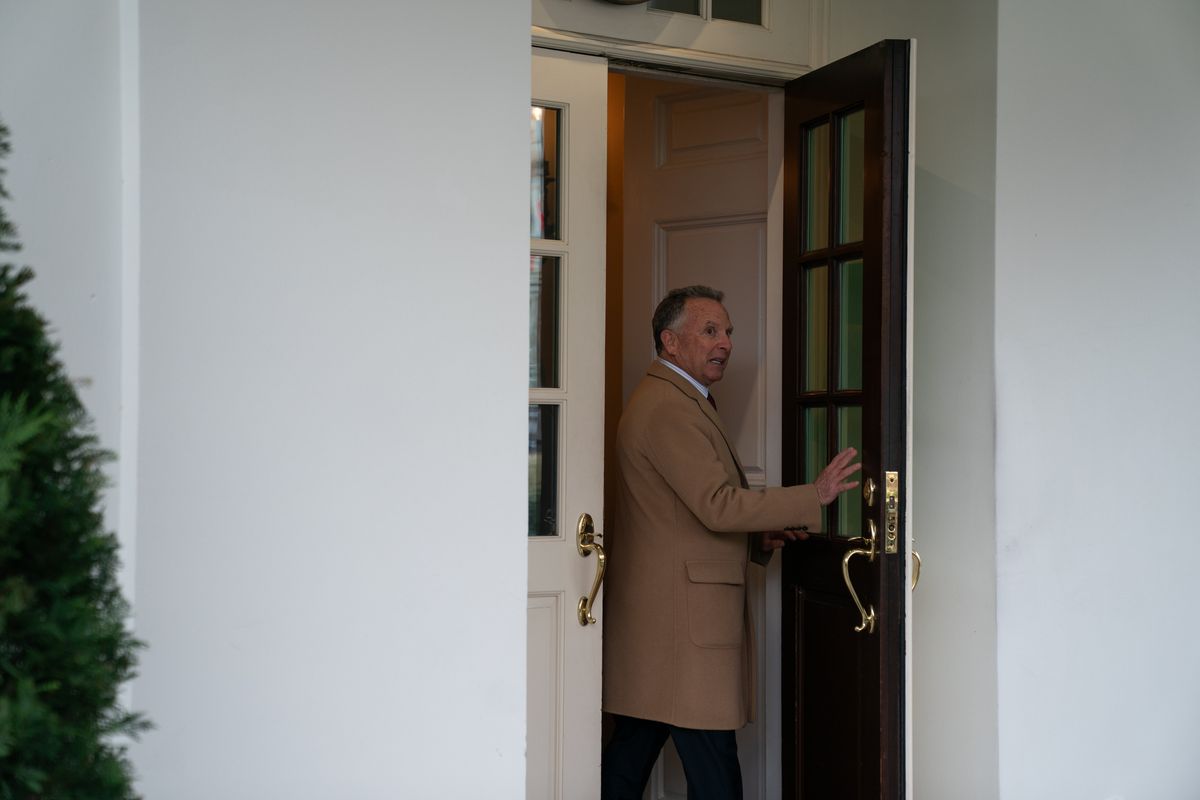High-level talks to disarm Iran’s nuclear program to begin in Oman
Iran President Masoud Pezeshkian, second from right, on Wednesday at a nuclear industry exhibition in Tehran, Iran. (AP)
The United States and Iran will hold their first high-level talks in a decade Saturday. Both sides say they are willing to make a deal on containing Iran’s nuclear program, but they remain far apart on the scope of any agreement or even whether their representatives will sit in the same room.
Steve Witkoff, President Donald Trump’s Middle East envoy and chief negotiator on a range of foreign policy issues, will head the U.S. delegation to the Persian Gulf sultanate of Oman, whose foreign minister will mediate talks with Iranian Foreign Minister Abbas Araghchi.
The meeting is the latest in Trump’s attempts at dealmaking on foreign policy challenges that he vowed would be quickly resolved at the beginning of his second term in office. Witkoff’s ever-expanding portfolio took him Friday to St. Petersburg for a third meeting with President Vladimir Putin over U.S. efforts to end Russia’s war in Ukraine.
But both that conflict and the Israel-Gaza war have escalated despite Witkoff’s mediation efforts. Both wars have some overlap with Iran, which has funded Hezbollah and Hamas and funneled drone technology to Moscow that has been used to batter Ukrainian cities. Israeli Prime Minister Benjamin Netanyahu and Trump have pledged military action against Iran’s nuclear sites if no agreement is reached with Tehran.
The Oman talks mark the first time the current Trump administration will try to negotiate its own agreement with a direct adversary. But even that seems a subject of ongoing negotiation: The White House says Witkoff and Araghchi will meet face to face, while Iran says it has agreed only to indirect negotiations, with Omani representatives as go-between.
“In my view, direct exchanges would be much, much preferable,” said former U.S. energy secretary Ernest Moniz, who was part of then-Secretary of State John F. Kerry’s negotiating team that sealed the 2015 agreement between world powers and Tehran, sharply restricting its nuclear program. Key nuclear facilities were subsequently opened to strict international verification in exchange for the lifting of U.S. and international sanctions against the regime.
Moniz, who now heads the Nuclear Threat Initiative, said he wouldn’t engage in indirect negotiations. “Both sides have shown a flexibility and willingness to enter negotiations, and there’s a premium to doing it expeditiously and in a way that does not invite misunderstandings,” he said.
Some in the administration thought Witkoff “shouldn’t bother” to go unless he would meet directly with Araghchi, said a U.S. official with knowledge of the planning who spoke on the condition of anonymity about the sensitive diplomacy. Others argued that it would be better for Witkoff to work it out on the ground in Oman and let each side put its own spin on the extent of the eventual negotiations.
“This is the first meeting to see what’s possible and where we can go from here,” the official said. “If it goes well, we would hope that we could start talks on a more technical level.”
The path to the Saturday meeting began years ago, with Trump’s 2018 withdrawal of the United States from the 2015 deal and imposition of “maximum pressure” sanctions on Iran. Biden administration efforts to reestablish the agreement failed, and Iran went on to vastly increase the quality and quantity of its enriched uranium.
Moniz said the stockpile of fuel could now be processed within a matter of weeks to fuel five or six nuclear weapons – an assessment shared by international inspectors and U.S. intelligence agencies.
Trump returned to office this year pledging to stop Iran’s nuclear program altogether, along with ending long-standing Iranian support for proxy militias in the Middle East – including Hamas in Gaza, Hezbollah in Lebanon and the Houthis in Yemen. Last month, White House national security adviser Michael Waltz called for “complete dismantlement” of Iran’s nuclear program. If Tehran refused to bend to U.S. demands, Trump said, there would be “bombing the likes of which they have never seen before.”
Weakened by a failing economy, its air defense systems decimated by Israeli strikes last year, and its proxies under attack by Israel in Lebanon and Gaza, and by the United States in Yemen, Iran is clearly ready for negotiations, said former Jordanian foreign minister Marwan Muasher. And despite his bluster, “Trump is interested in negotiations rather than war as a first option. I’m not even sure he would go to war anyway,” he said.
Despite his threats to bomb Iran and strong support for Israel, Trump clearly surprised Netanyahu when he announced during a meeting between the two Monday in the Oval Office that talks near “the highest level” had been set with Iran. “He was telling Netanyahu he didn’t want military intervention,” Muasher said.
Netanyahu provided his own interpretation. He and Trump “agree that Iran must not obtain nuclear weapons,” Netanyahu said in a video statement broadcast in Israel after the meeting. “This can be achieved through an agreement,” he said, but only “one that involves entering, blowing up the facilities, dismantling all equipment, under American supervision and execution.”
“The second option,” Netanyahu added, “is that [Iran will] … just drag out the talks, and then the only option is military. Everyone understands that. We discussed this at length.”
On Wednesday evening, shortly after returning to Israel, Netanyahu met with CIA Director John Ratcliffe and David Barnea, head of Israel’s Mossad spy agency, and then briefed his security cabinet on his intention to fully coordinate with the Trump administration on the Iran talks, according to an Israeli official who spoke on the condition of anonymity because they were not authorized to speak with the press.
“Israel’s preference, no doubt, is for a military solution,” said Yaki Dayan, Israel’s former consul general to Los Angeles. “Iran is at its lowest point ever, its proxies received a huge blow, its air defense systems are mostly shattered, and its legitimacy is nonexistent, even in Europe, because of Iran’s support for Russia in the Ukraine war.”
“But Trump, the master of deals, wants to reach a deal, and Israel needs to play accordingly,” he said.
There is ample room for talks to fall apart as each side tries to draw the parameters of negotiations. In contrast to the Trump administration’s expansive view of the subjects to be addressed, Araghchi said this week that the nuclear issue is the only one under discussion, according to Iranian media reports.
Iranian negotiators are probably seeking a limited agreement with the United States that can be finalized quickly, according to Hossein Mousavian, a former Iranian ambassador who served on the country’s nuclear negotiating team.
“If Trump asks for dismantlement” of Iran’s entire nuclear program, “there is no chance. It’s a deal killer,” he said. Netanyahu’s idea of a “Libya-style deal,” in which Moammar Gaddafi voluntarily gave up a nascent nuclear weapons program in 2003 after the United States threatened to destroy it, he and others suggested, was far beyond the bounds of what Iran would accept.
But if U.S. negotiators are looking only to prevent Iran from developing a nuclear weapon, impose greater transparency and set limits on enrichment, the two sides could agree to further talks aimed at reaching a broad “understanding on principles,” said Mousavian, similar to the first phase of the negotiations leading to the 2015 nuclear deal.
Iran has long been skeptical of engagement with the United States, and Trump in particular has angered Tehran on multiple occasions. In addition to withdrawing from the 2015 deal, Trump ordered the 2020 drone strike that killed Qasem Soleimani, a widely admired senior Iranian general, and has repeatedly imposed new sanctions – including as recently as this week.
Inside Iran there were some signs of cautious hope. Its currency rebounded slightly after hitting another historic low last week when it traded at more than 1 million rials to the dollar.
But many Iranians who have been struggling to make ends meet under years of crippling sanctions dismissed the upcoming meeting as political theater that will not alter the country’s overall trajectory.
“I don’t really think anyone expects things to get better. The highest expectation they might have is that the speed of the worsening is going to lower for a while,” said Mostafa, a 49-year-old nurse from Tehran who said the deteriorating economic situation in Iran has left professionals like himself unable to support their families. He spoke on the condition that he be identified by only his first name for fear of reprisals.
U.S. allies in the region also welcomed the news of talks, eager for the United States and Iran to engage diplomatically after weeks of escalatory remarks and military buildups in the region.
“Another kinetic episode would be unhelpful in the region; no one wants to see another war,” said a United Arab Emirates official, who also spoke on the condition of anonymity to discuss sensitive diplomacy.
Iranian President Masoud Pezeshkian appeared to signal openness to talks while also attempting to project strength during a tour of a nuclear industry exhibition Wednesday. “We don’t seek to possess nuclear weapons,” he said, according to coverage of the event by state-run media.
“We don’t seek war and won’t attack any country, but will confront any aggression with force. The more intense the strikes and threats, the more resilient we will be,” he said.

